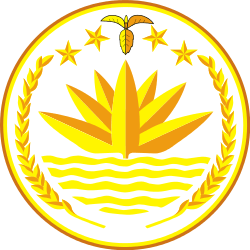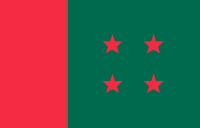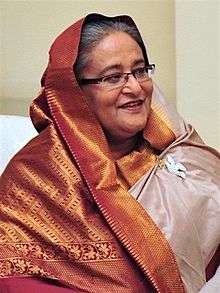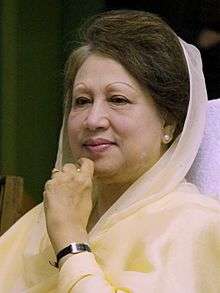List of political parties in Bangladesh
 |
| This article is part of a series on the politics and government of Bangladesh |
|
Constitution |
|
Executive |
|
|
Political parties |
|
Foreign policy |
This article lists political parties in People's Republic of Bangladesh.
Bangladesh has a fading two-party system, which means that there are two dominant political parties, with extreme difficulty for anybody to achieve electoral success under the banner of another party.
However, though the center-left Awami League (AL) and center-right Bangladesh Nationalist Party (BNP) dominated Bangladesh politics for a long time, currently both are heading coalitions of like-minded parties with the AL leading the secular and liberal elements while BNP is rallying the right-of-centre parties.
Alliances
Grand Alliance
The Grand Alliance (মহাজোট) also known as 14 Party Alliance is a coalition government in Bangladesh that formed in 2008 and consisted of the Bangladesh Awami League, Jatiya Party, Jatiyo Samajtantrik Dal, Workers Party, Liberal Democratic Party and nine other parties.
Liberal Democratic Party came out of the Grand Alliance before the election and contested independently. The LDP joined the 18 Party Alliance in 2012.
18 Party Alliance
The 18 Party Alliance is an alliance of some Bangladeshi political parties led by Bangladesh Nationalist Party and other right wing parties. It was formed on 18 April 2012 in Dhaka, extending its predecessor the Four Party Alliance.[4] The 18 Party Alliance is formed as an effort to strengthen the anti-government movement demanding restoration of the caretaker government system.
Major parties
Bangladesh Awami League
 |
The Bangladesh Awami League (Bengali: বাংলাদেশ আওয়ামী লীগ; translated from Urdu: Bangladesh People's League) is one of the two largest political parties of Bangladesh. It is the country's current governing party, after winning a majority in heavily criticized 2014 parliamentary elections where the majority of seats were uncontested.[5] The All Pakistan Awami Muslim League was founded in Dhaka, the former capital of the Pakistani province of East Bengal, in 1949 by Bengali nationalists Maulana Abdul Hamid Khan Bhashani, Yar Mohammad Khan, Shamsul Huq, and later Huseyn Shaheed Suhrawardy. In 1953, the party's council meeting voted to drop the word "Muslim" from its name in order to give it a more secular outlook, owing to need of including the province's large Hindu population in Pakistani politics. Amongst the leaders of the Awami League, five have become the President of Bangladesh, four have become the Prime Minister of Bangladesh and one became the Prime Minister of Pakistan. His daughter and also the incumbent Prime Minister of Bangladesh, Sheikh Hasina, has been heading the party since 1981. |
Bangladesh Nationalist Party
|
The Bangladesh Nationalist Party (Bengali: বাংলাদেশ জাতীয়তাবাদী দল, transliterated: Bangladesh Jatiotabadi Dôl), often abbreviated as BNP was founded on 1 September 1978 by former Bangladeshi President Ziaur Rahman, politician and physician A. Q. M. Badruddoza Chowdhury, human rights activist and lawyer Moudud Ahmed and leftist politician Mashiur Rahman as the key people. Till date, BNP has won the second, fifth, sixth and eighth national election and two Presidential elections in 1978 and 1981 respectively. The party also holds the record of being the largest opposition in the history of parliamentary elections of the country with 116 seats in the seventh national election of 1996.[6] The party does not have any representation in the parliament after its boycott of the national election of 2014 which the party had termed a scandalous farce and was marked by a very low turnout.[7] |
Jatiya Party (Ershad)
 |
The Jatiya Party (Ershad) (National Party (Ershad)) was established by President Hussain Mohammad Ershad on 1 January 1986. The Army Chief Lieutenant General Hussain Muhammad Ershad had usurped the state power by a coup d'état on 24 March 1982, and ruled the country as chief martial law administrator till December 1983. Political parties and activity had been prohibited during the state of emergency, when Justice A. F. M. Ahsanuddin Chowdhury was appointed President of Bangladesh. The Jatiya Party had a rift in leadership and an internal wrangle in 2000. The three factions were headed by General Ershad, Anwar Hossain Manju and Naziur Rahman Manju. In the general elections of 2001, the Ershad group of the Jatiya Party won 14 seats, and the Anwar Hossain group won one seat. |
Minor parties
These are the minor parties are registered at the Bangladesh Election Commission[8]
- Liberal Democratic Party (Bangladesh)
- Jatiya Party (Manju)
- Communist Party of Bangladesh (Marxist–Leninist) (Barua)
- Krishak Sramik Janata League
- Communist Party of Bangladesh
- National Awami Party
- Workers Party of Bangladesh
- Bikalpa Dhara Bangladesh
- Jatiyo Samajtantrik Dal
- Jatiyo Samajtantrik Dal-JSD
- Bangladesh Jatiya Party – BJP
- Bangladesh Khilafat Andolan
- Gano Forum
- Progressive Democratic Party (Bangladesh)
- Bangladesh Jatiya Party
- Islamic Front Bangladesh
- Islami Oikya Jote
- Bangladesh Khelafat Majlish
- Islami Andolan Bangladesh
- Bangladesh Islamic Front
Regional parties
Unregistered parties
See also
References
- ↑ Alam, Julhas (5 January 2014). "Fear for Bangladesh as 'Begums' fight forfuture power". Daily Express. London.
- ↑ "Women and property rights: Who owns Bangladesh?". The Economist (Blog). 21 August 2013. Retrieved 2 December 2013.
- ↑ Torild, Skard (2014). Women of power: Half a century of female presidents and prime ministers worldwide. Policy Press. pp. 135–. ISBN 978-1-4473-1578-0.
- ↑ "BNP-led 18-Party Alliance emerges". bdnews24.com. 18 April 2012. Retrieved 16 August 2016.
- ↑ Barry, Ellen (6 January 2014). "Bangladesh's Governing Party Wins Vote Amid Unrest". The New York Times.
- ↑ "Bangladesh Election Results". Bangladesh Election Commission. 10 April 2008.
- ↑ "Bangladesh's ruling Awami League wins boycotted poll". BBC News. 6 January 2014.
- ↑ http://www.ec.org.bd/English/RegisteredPoliticalPartyEng.php

